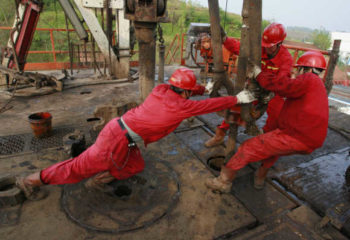
The sustenance of the relative peace in the oil-rich Niger Delta is critical to the achievement and delivery of the 2017 budget.
The Federal Government must therefore, take the current peace in the restive region seriously by ensuring that the promises it made to the people are kept particularly with regards to fulfilling its side of the agreement on modular refineries.
The Chairman, Petroleum and Natural Gas Senior Staff Association of Nigeria and National Union of Petroleum and Natural Gas Workers (PENGASSAN & NUPENG) Petroleum Industry Bill (PIB) Committee, Comrade Hyginus Onuegbu, said this was necessary to avoid any disruption in oil and gas operations.
He noted that there was nothing in the 2017 budget that inspired hope that Nigeria will pull out of recession, adding that what will pull the country out of recession are basically happenings in the oil and gas industry where there is need to sustain the current relative peace in the Niger Delta to ensure continued oil production.
Acting President Osinbajo had on Monday last week, signed the N7.44 trillion 2017 budget, which he said was designed to bring the Nigerian economy out of recession onto a path of sustainable and inclusive growth.
Osinbajo said the budget has a revenue projection of N5.08 trillion and an aggregate expenditure of N7.44 trillion, and that the projected fiscal deficit of N2.36 trillion is to be financed largely by borrowing.
But Onuegbu said the budget was merely an estimate, and that its revenue targets are based on assumptions hence, “if there is crisis in the Niger Delta, the nation’s oil production target will not be met, and of course, its revenue target will not be met, forcing the nation to resort to borrowing.”
Onuegbu, who was immediate past Chairman, Rivers State chapter, Trade Union Congress (TUC) of Nigeria, expressed regrets that Nigeria’s debt service obligation was too high. “It’s a big challenge. One third of the budget is to be financed by borrowing.
“And when you borrow, the reason for which you borrow the money must be economically viable to be able to repay the loan otherwise that loan will become a big burden on you,” he noted.
The PIB Committee Chairman, therefore, said for Nigeria to avoid the debilitating effects of plunging into another debt trap, the government must take the current relative peace in the Niger Delta seriously by ensuring that promises it earlier made to the people of the region are honoured.
He argued sustaining the peace in the region was necessary to wad off disruption in oil and gas operations.
“Oil production is up now, getting to 1.8 million barrels per day; it was very low last year because of militant attacks. Besides, oil price is better this year than last year. The Federal Government should understand that critical to the achievement and delivery of the 2017 budget is the maintenance and sustenance of the peace in the Niger Delta so as to engender increase in oil & gas production that we are witnessing now,” he said.
Onuegbu noted that a combination of the agreement signed on the December 16 last year between the oil companies and the Ministry of Petroleum Resources on existing cash call and funding of more oil and gas projects will lead to increased production, if there is continued peace in the Niger Delta.
He also said there is need for oil price to rally round $60 per barrel before Nigeria’s hope of coming out of recession can materialise, not necessarily because of any special aspect of the 2017 budget.
“As a matter of fact, the 2017 budget should not be celebrated. This is a budget that was signed in the middle of the year,” Onuegbu argued.